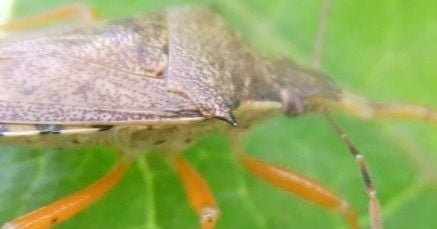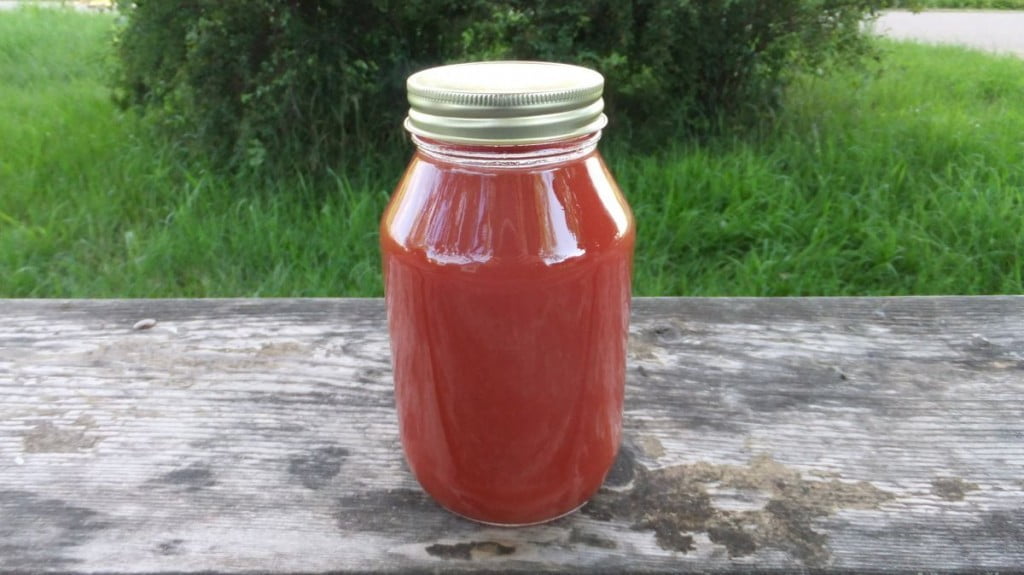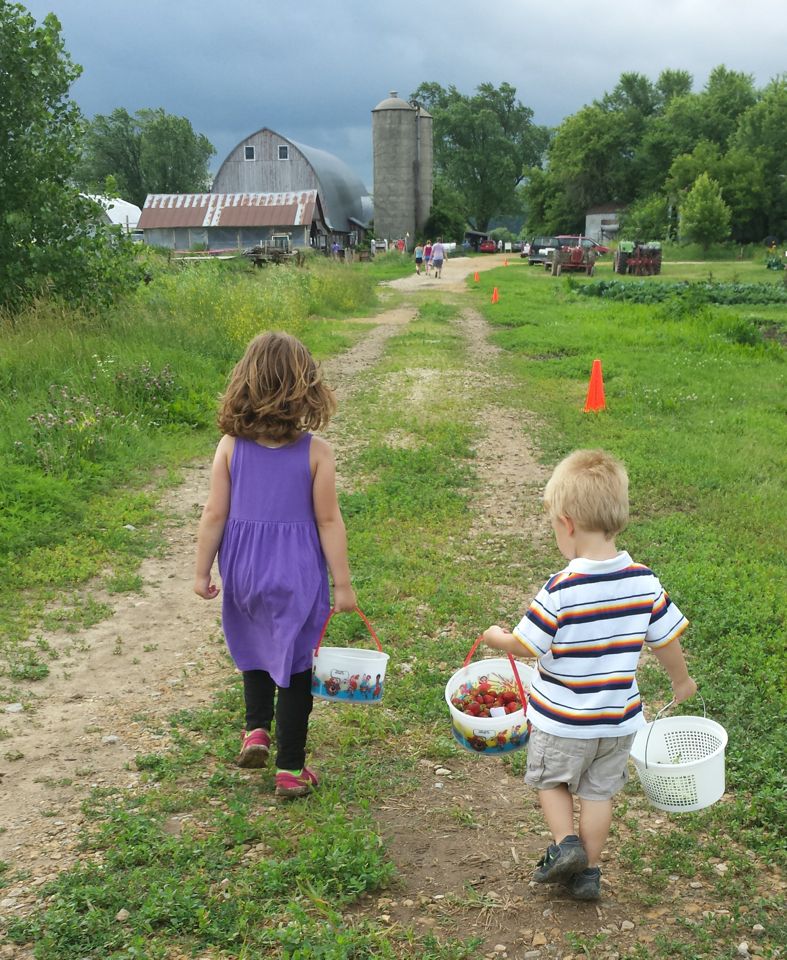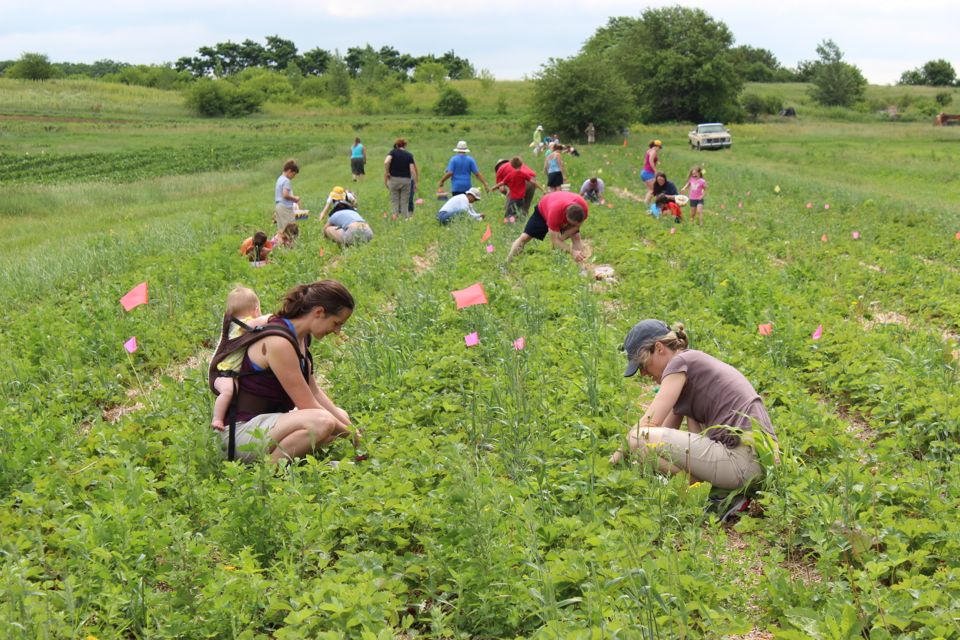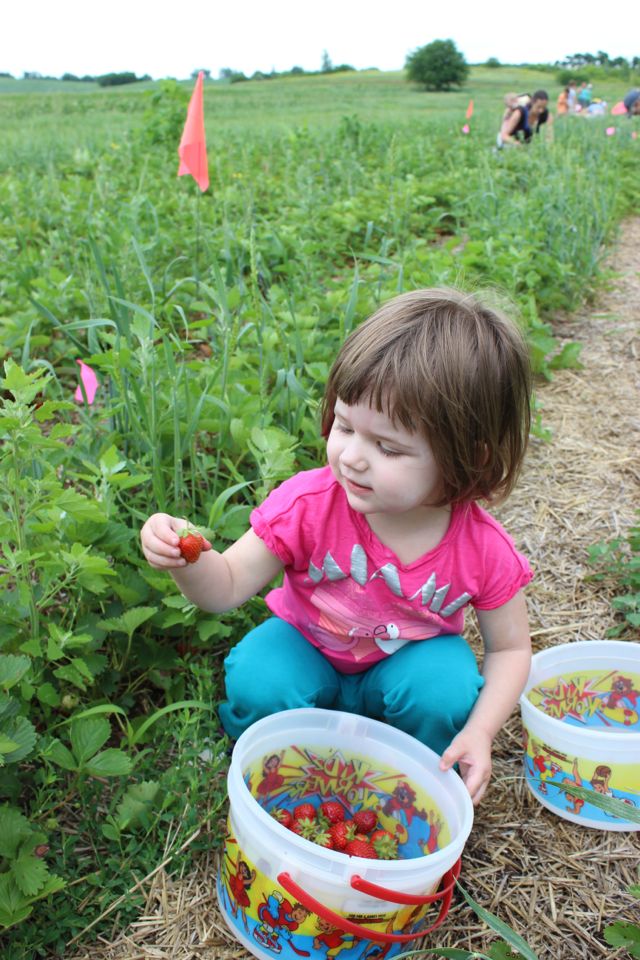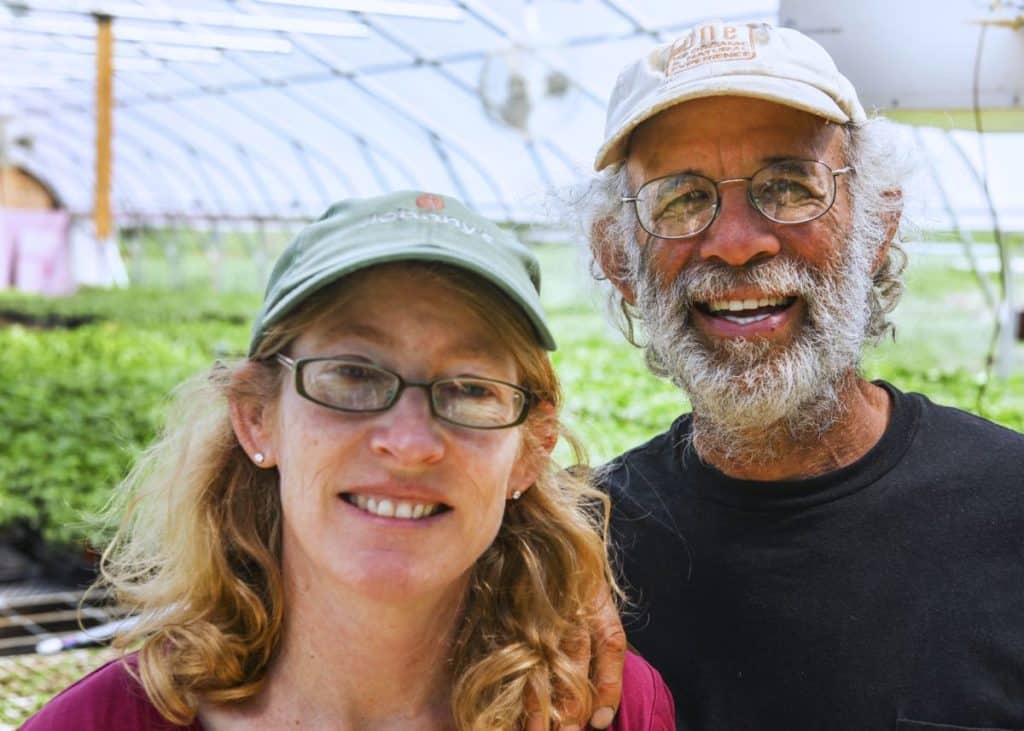Monthly Archives: July 2014
Cool bug drama
- On: July 23, 2014
 0
0
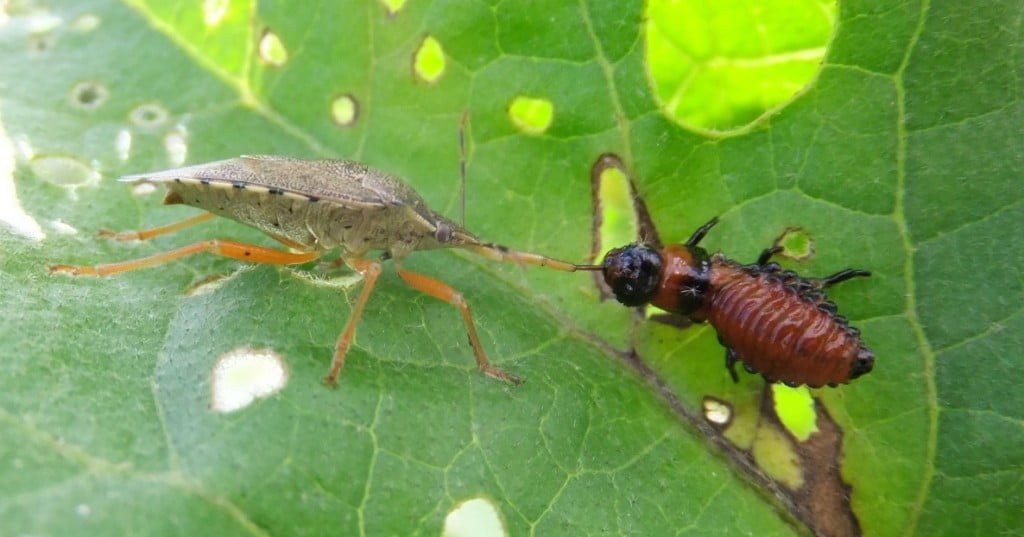
Spined soldier bug attacking a Colorado potato beetle larva.
I discovered this miniature battle among our eggplants. I was scouting for Colorado potato beetles, a pest that can defoliate eggplants. The attacking insect on the left is a spined soldier bug, a type of stinkbug. Most stinkbugs feed on (and damage) vegetables. However, the spined soldier bug feeds on other insects, especially Colorado potato beetles. This is so helpful! You can distinguish a spined soldier bug from other stinkbugs by the spines on its “shoulders.” Sucking out the brains of Colorado potato beetles is another clue. It was so cool to see this happening. This is organic agriculture at work, but it’s so easy to overlook.
CSA housekeeping
– Email brown-out from noon July 25 to August 4. I am taking our children to visit family on the east coast. We ask that you limit communication with us from July 25 through August 4. Please contact us no later than 12:00 noon on July 25 to ask questions, cancel a box, etc. Steve will check my emails but won’t have much time to respond. I’ll be back and ready to communicate on August 4. Thanks for your help with this.
– August 1 checks. Many of you paid us with checks dated August 1. I will deposit the checks on August 8.
Support a family in need.
Steve and I are members of FairShare CSA Coalition, a group of local farmers dedicated to promoting the CSA idea in Wisconsin. Our vibrant Partner Shares program supports CSA shares for low-income households. We thank each of you who donated to Partner Shares while registering for your Tipi CSA share this year. In hopes of expanding the number of families we can support next year, FairShare is holding a donation drive from July 21 through August 8. FairShare writes “We believe every family should have access to locally produced, organic food. Unfortunately, for many people, purchasing local, farm-fresh, food is beyond their means. The Partner Shares program brings fresh produce within reach for low-income families by providing up to $300 toward the cost of their CSA share.”
As you enjoy the produce we’ve grown for you, we invite you to share this experience with others in your community. Please donate to the Partner Shares program and “Share a Share” today. For more information about Partner Shares and how you can donate please visit FairShare’s website: www.csacoalition.org/news/partner-shares-donation-drive-july-21-august-8/. Thank you.
Bike the Barns registration is open but filling quickly.
Another way to support Partner Shares is by participating in the Bike the Barns bicycle tour. This year’s ride heads northeast of Madison, with two routes (45-mile, 60-mile), interesting farms, and excellent food. Read more and register here. The ride usually sells out by August 15, so you should make your decision soon.
Farm news
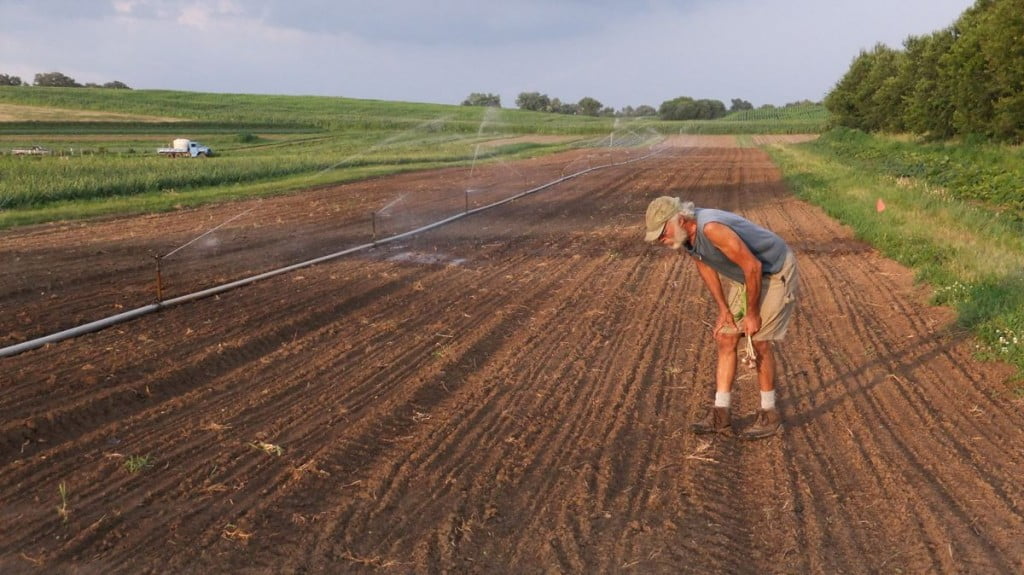
Steve irrigates a young carrot planting, and checks for emerging carrot seedlings. Carrots need to stay moist for 12 days after planting in order to germinate and emerge well. Rain is wonderful. Irrigation is reliable. We’ve had good germination in our carrot plantings this month because of the frequent rains. The carrots we plant in July will be ready to harvest in October and November. We’ll store the carrots for sale through the winter to the Willy Street, Outpost and Basics coops. I showed a photo of this exact field earlier this spring. It was planted to lettuce and scallions then.
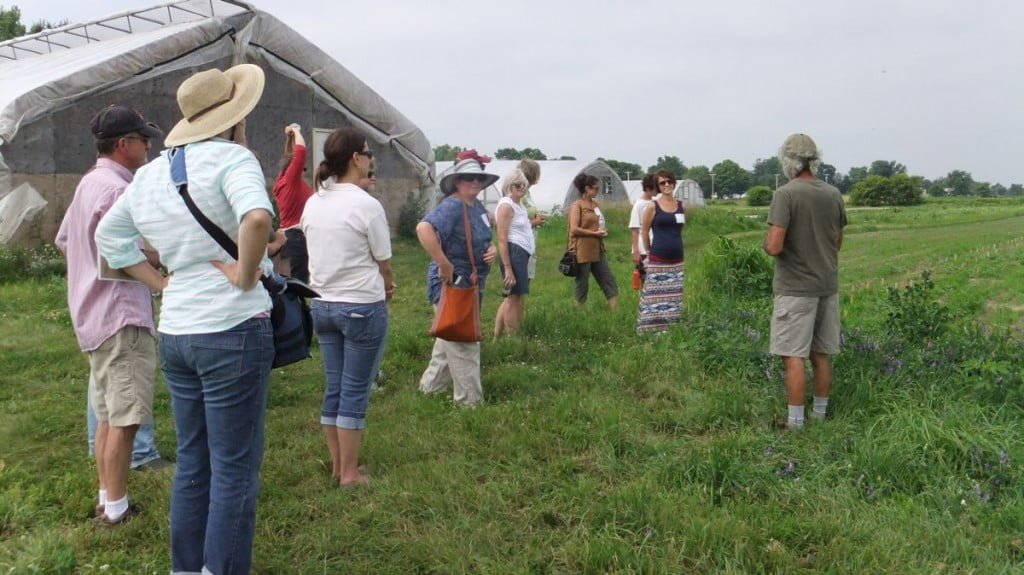
We hosted a farm tour this week for the Wisconsin Organic Advisory Council. Steve (at right) serves on the council which advises the WI Department of Agriculture on issues related to organic ag. Participants include farmers, consumers, organic advocates, business and nonprofit representatives. The group stands in front of carrot trials we’ve planted in collaboration with UW/Madison professor Erin Silva (second from right).
Veggie list and veggie notes (July 24/25, week #10, purple EOW)
Green beans, 2 lb
Broccoli, 1+ lb
Carrots, 2 lb
Kale (either green or lacinato kale), 1 bunch
Walla Walla onion, 1 large
Zucchini and summer squash, about 2.5 lb
Cucumbers, 2
Basil, several sprigs
Cherry tomatoes OR globe eggplant OR Japanese eggplant
Fresh garlic, 1 small
Next week’s box will probably contain snap beans, melon, sweet corn (?), lettuce, tomatoes, onions, zucchini, cucumbers, bell peppers, basil and more.
Fresh garlic – Refrigerate and eat soon. This young garlic won’t spoil at room temperature but will become more difficult to peel as it dries. The skins are still moist and will come off easily. At this early stage, we clean the garlic by hosing it off, and it’s still damp. We grew these heads but most of the garlic we send to you will be from John Hendrickson of Stone Circle Farm. We planted garlic ourselves this year so we can increase the amount of garlic you receive from us.
Interesting project
- On: July 16, 2014
 0
0
Last season, our tomatoes produced a bumper crop and we debated what to do with them. We sent 5 lb bags in the CSA boxes week after week. We sold bulk cases to you folks for preserving. We couldn’t bear to let them rot in the field but they were ripening very very quickly. I hunted up a small processor in East Troy called Contract Comestibles to bottle the ripe tomatoes as juice. It’s just pureed tomatoes seasoned with salt and organic onion, garlic and black pepper. We planned to send the juice in an early CSA box this year but those early boxes were full with spring crops.
This is a good moment to include it in the CSA box because you can use it as a base for soup. I made soup with sautéed zucchini, diced Walla Walla onion and minced oregano, simmered together with the juice, and topped with feta cheese. It was a quick and tasty meal with pasta. I am eager to see what Pat at Local Thyme does with it. Of course, the easiest approach is to simply drink it.
It was an interesting project for me. Farming is endlessly varied but it’s fun to tackle something new. I know a lot more about food processing now. We are curious if you consider this a valuable addition to your CSA box, and whether you think we should do this again in a bumper tomato year. Please let us know your thoughts. We’ve spanned an entire year in this box, from last year’s bottled ripe tomatoes to this year’s cherry tomatoes. I love it. Beth
Email brown-out
I am taking our children to visit family on the east coast. Steve will stay here at the farm. We ask that you limit communication with us from July 25 through August 4. Please contact us no later than noon on July 25 to ask questions, cancel a box, etc. This is an email brown-out, not a black-out. Steve will check my emails but won’t have much time to respond. I’ll be back and ready to communicate on August 4. Thanks for your help with this. Beth
Why did we sell basil last week instead of putting it in the CSA boxes?
We offered basil for sale to members last week. Several members wondered why we sold it instead of putting it in the CSA boxes. This is an excellent question.
Answer #1.
Both parsley and basil were ready to harvest, with oregano looming. We chose parsley for the CSA boxes last week because we had sent basil the week before. It takes a long time to pick those little bunches so we send one herb per week. Our expected herb sequence is basil (July 3), parsley (July 10), oregano (July 17), basil (July 24), basil (July 31). Let’s see if the plants cooperate.
Answer #2.
We have promised to sell extra basil, tomatoes and peppers to you members for preserving, when we have enough to sell. It’s a benefit of being part of our CSA. Our first priority for any crop is to provide it in your CSA boxes. When we have an abundance, we’ll offer extra for sale to members.
How do the extra produce sales work?
I will send an email to everyone when we have extra produce to sell. The email has instructions plus a link to place your order online and pay via credit card. Please order online instead of sending a request by email. It streamlines the process for us. Regular season CSA members (weekly or every-other-week) can order extra produce. A few members have asked that we give more advance warning when offering extra produce for sale. I will try to do that.
When are the next basil sales?
I hope to offer basil for sale next week (July 24/25) but won’t know until I’m sure we have enough for all the CSA boxes. Watch for an email from me mid-week.
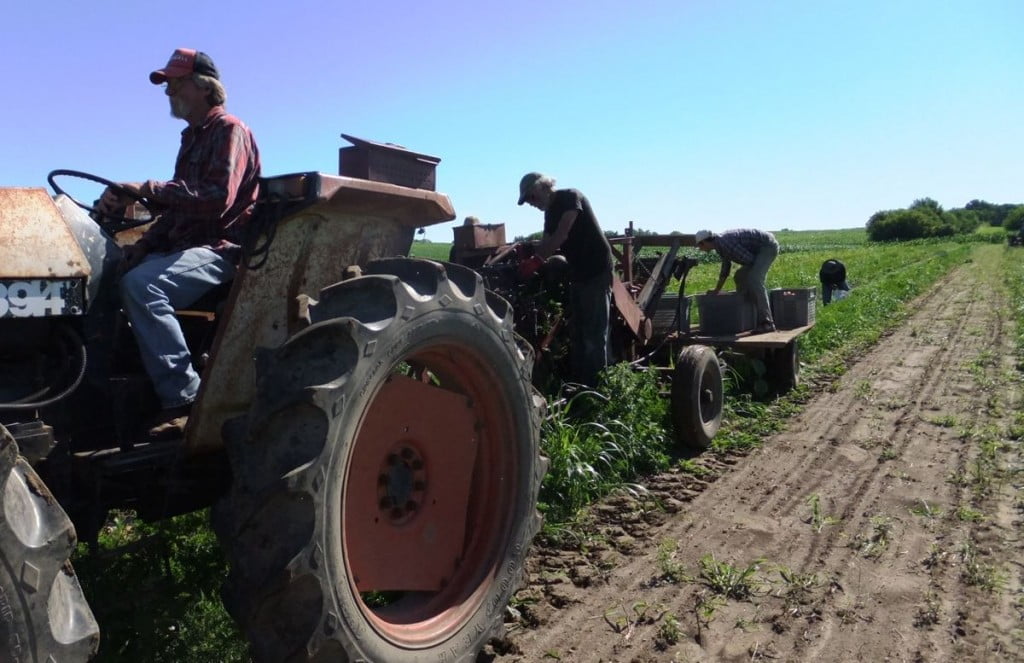
First carrot harvest of the year! From left, Larry drives the tractor, Steve guides the root harvester, John manages the carrots on the wagon and Edgar picks up missed carrots. Steve was very pleased with this first harvest.
Veggie list and veggie notes (7/17/14, week #9, green EOW)
These are our first harvests of bell peppers, oregano, carrots and beets. A few sites will get cherry tomatoes, while others will get broccoli. The cherry tomato pints are not completely full; we wanted to share these first tomatoes as widely as possible. Soon we’ll have cherry tomatoes for everyone.
- Tomato juice, 1 quart
- Carrots, 2 lb
- Beets, 1.5 lb
- Romaine lettuce
- Snap peas, 0.6 lb
- Green bell pepper, 1
- Walla Walla onion
- Zucchini & summer squash, about 2.5 lb
- Cucumbers, 2
- Oregano, 1 bunch
- Broccoli OR cherry tomatoes
Next week’s box will probably contain green beans, broccoli, carrots, kale, zucchini and summer squash, cucumbers, Walla Walla onion, garlic, basil and more.
Tomato juice – Store out of sunlight at room temperature when unopened. Refrigerate after opening. The juice is already seasoned so don’t add salt if you cook with it. I’ve listed the ingredients and nutritional information here.
Beets – Beets are excellent cooked or raw.
Storage: Cover and refrigerate. Beet roots will last for weeks. For all the cooking methods below, wash and scrub the beets but do not peel. The skins slip off easily once the beets are cooked and cooled.
Cooking beet roots on the stovetop: Slice or quarter, cover with water in a pot, and simmer until tender. This will take from 25 to 45 minutes depending on how large the beet pieces are. Drain.
Roasting beets: Wash beets, but do not peel. On a sheet of aluminum foil, put beets (halved or quartered if large), salt, pepper and a few sprinklings of water. Seal the foil packet, and roast at 400oF until tender, about 45 minutes to 1 hour. Slip off skins once cool. Microwave: Slice beets in half and place in a large microwave-proof bowl. Add ¾ inch water and cover with a plate. Microwave on high until tender, about 9-20 minutes, depending on your microwave’s power. Drain and slip off skins.
Raw: Grate raw beets for marinated salads.
Uses: Use cooked beets in cold salads, or dress simply with vinaigrette, onions, salt and pepper. Beets are also good tossed with sour cream, minced onion, fresh herbs and walnuts.
Oregano – Cover and refrigerate.
july 10 2014
- On: July 09, 2014
 0
0
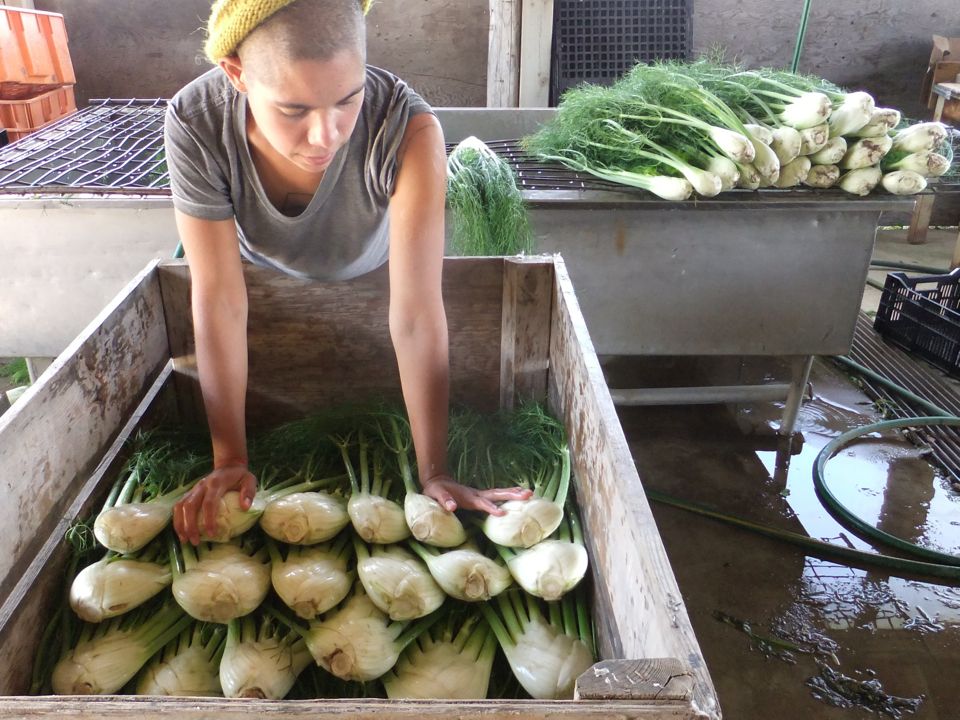
Boi washes and counts fennel for this week’s box. The frilly tops are fragrant and lovely.
What should you do when on vacation?
Let’s review how to reschedule a CSA box. This is the same information we offered in our CSA Handbook this spring. Please send complete info when you ask to reschedule a box. It’s a big help. Madison members with Honeybee bread shares, please contact Mary directly to reschedule your bread.
Tipi Vacation Policy. We understand that members go on vacation. You have three options:
1. Cancel your box. Please give us one week advance notice.
2. Have a friend pick up the box for you. Make sure he/she knows how to get the box. Give him/her the instructions for your site (see 5/9/14 email from us) so they have the directions and hours, and know how to contact your site host.
3. You can reschedule up to two boxes per season. We need one week advance notice. You must choose the replacement date at the time that you cancel the box. Send us an email with …
– the *primary name for your share
– your pick-up site
– your share type (weekly or EOW/green or EOW/purple)
– the date you want to postpone
– the new date you would like to reschedule for.
*The primary name for your share is the first name listed on the check-off sheets.
Weekly members, you will receive two boxes on the rescheduled date.
Virtual tour of our two strawberry u-picks
During every farm event, I start chatting and forget to take photos. Fortunately, you folks took pictures and are willing to share. Thank you! Here is a sampling. We were lucky that the weather stayed clear during both u-picks. As you can see in the first photo, storm clouds blew in just as the first u-pick ended.
Veggie List and Veggie Notes (7/10/14, week #8, purple EOW week)
You’ll notice a switch to summer vegetables. We hope you enjoy this box. We think it’s an especially nice one.
Cabbage, 2 to 3 lb
Swiss chard, 1 bunch
Snap peas, 3/4 lb
Snow peas, 1/4 lb
Both types of peas are in one bag.
Fennel with tops, 1
Zucchini & summer squash, 2 to 3 lb
Cucumbers, 3
Red bibb lettuce, 1 tiny
Walla Walla onion, 1
Parsley, 1 generous bunch
Next week’s box will probably contain beets with greens, carrots, peas, Walla Walla onion, zucchini, cucumbers, kale, herbs and more.
Cabbage – This is another head of salad-type cabbage. These have thinner, more tender leaves than the usual green cabbage. Great in salads and slaws but can also be cooked.
Fennel (large vegetable with a fat bulb and lacy fronds) – Fennel is a ‘swing vegetable’; it can be used raw or cooked. Clean well and slice as thinly as possible for use in raw salads. It is good simply prepared with olive oil, lime or lemon juice, salt and shaved parmesan cheese. Cooking softens and sweetens fennel, and mellows its anise flavor. Both the bulb and leaves are edible. Here are ideas from Alice Water of Chez Panisse about how to use fennel: ‘It’s strong anise characteristic seems to suit fish particularly well. … We use fennel all the time. We add the feathery leaves to marinades for fish and to numerous salads, sauces and soups and we use them as a garnish, too. … The bulbs are sliced and served raw in salads in various combinations with other vegetables, parboiled for pastas; caramelized and served as a side dish; braised whole; or cooked in vegetable broths & fish stocks.”
Red bibb lettuce – These heads are tiny but very nice. We harvested them young because it’s risky to leave them in the field in wet weather. They should be useful in a mixed salad or as a bed for marinated vegetables.
Walla Walla onions – These are sweet onions, like Vidalias. Wonderful raw or lightly cooked. This week’s onions are unusually plump for this time of year.
What do farmers do during rainy weather?
- On: July 02, 2014
 0
0
It’s been too wet for field work this week. We harvest your veggies rain-or-shine, but can’t take tractors in the fields when the ground is too muddy. Steve spent his time buying more irrigation pipe. How ironic is that, to work on irrigation during a monsoon? We will enjoy the new pipe; it will allow us to irrigate five big carrot fields (over 3 acres) at once without moving pipe. This is a big improvement. Of course, the carrots are not planted yet because the ground is too wet.

Steve with our new irrigation pipe.

The business end of the pipe although, as Steve says, “it’s really good to have both ends.”
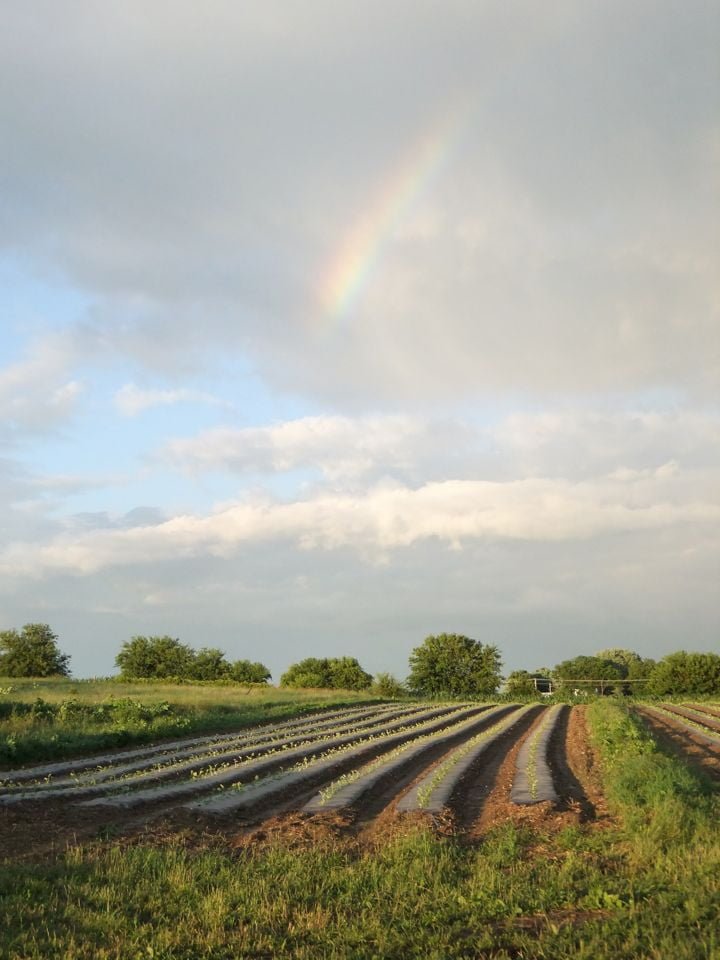
A sunny moment between rain storms.
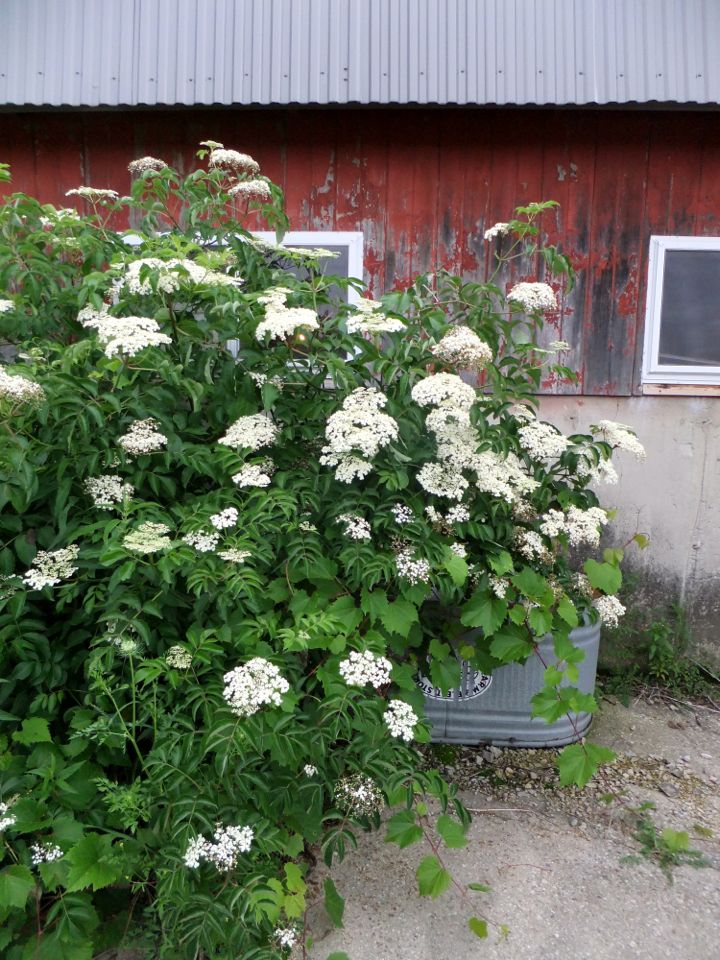
The elderberry bushes are spectacular this year.

Every bride should carry lacy elderberry blossoms, never mind the funky smell.
Veggie List and Veggie Notes (week #7, green EOW)
We enjoyed the strawberry u-pick on Sunday. Lots of members came to pick berries and wander the farm. Fortunately, the u-pick berries ripened during somewhat drier weather. Sadly, pounding rainstorms on Sunday night and Monday damaged the late berries. That ends our strawberry season.
We’ve sent a lot of squash and cucumbers because the plants were remarkably productive this week. Our bees did not visit (or pollinate) our squash plants for a long time because of rainy or windy weather. Once the plants got pollinated during dry spells, they exploded with rapid squash growth. Same thing happened with the cucumbers. Grilled squash and cucumber salad are great 4th of July dishes. Enjoy!
Snap peas, 1.4 lb
Broccoli, 1 head
Zucchini & summer squash, 3 – 3.5 lb
Cucumbers, 4
Collard greens, 1 bunch
Green leaf lettuce, 1 small
Kohlrabi, 1
Scallions, 1 large bunch
Basil, 1 sprig
Next week’s box will probably contain cabbage, zucchini, fennel, parsley, cucumbers, lettuce, scallions OR Walla Walla onions, and more.
Basil (curly-leaved sprig) – This is the variety ‘Napoletano.’ The leaves are larger and more frilly than most basils. We like this variety because the its leaves remain tender and flavorful even as the plants mature. Basil will blacken if stored in the refrigerator. It is best stored at room temperature with the cut ends in water, for example in a glass or teacup. Give the stem a fresh trim. You will receive one sturdy stem this week. We snipped these sprigs to shape the plants. They are a bit tattered from the recent rains but taste (and smell) great.
Green leaf lettuce – The lettuce are quite small. We harvested them young while they are still good. It’s a good strategy during wet or hot weather.

